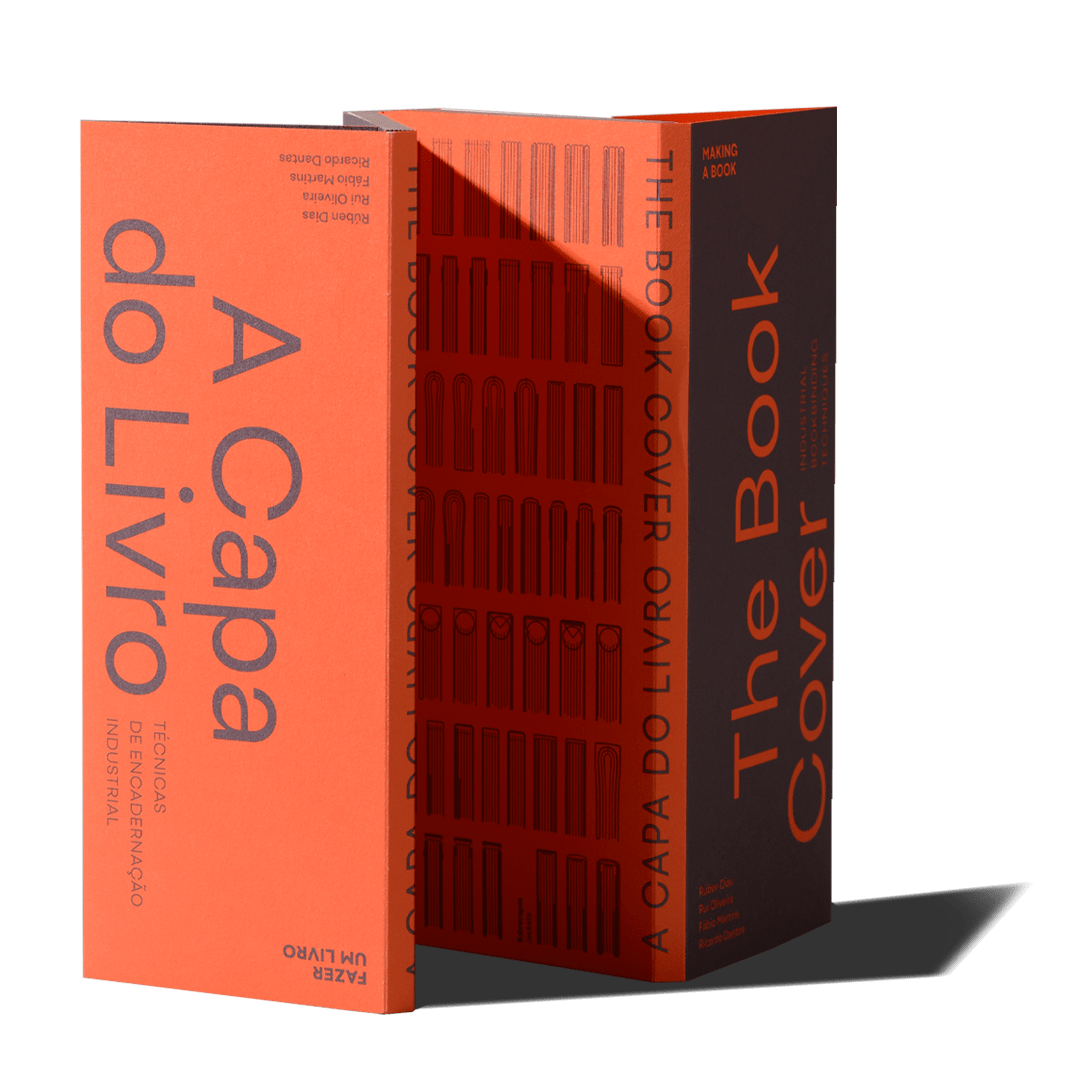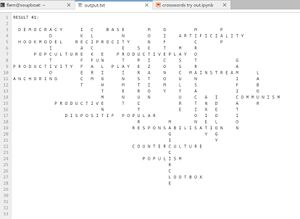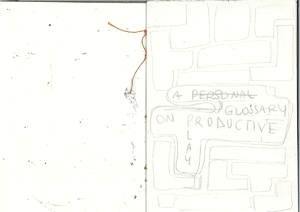User:FLEM/Crosswords: Difference between revisions
No edit summary |
|||
| Line 62: | Line 62: | ||
<gallery> | <gallery> | ||
Prototype .gif| Prototype for proposal (3) | Prototype .gif| Prototype for proposal (3) | ||
</gallery> | </gallery> | ||
Revision as of 13:46, 7 March 2022
.experiments
08.02.2022
there must be a way to put a dot or something at the end of words!
Create a grid of whatever size and a list of words.
Shuffle the word list, and then sort the words by longest to shortest.
Place the first and longest word at the upper left most position, 1,1 (vertical or horizontal).
Move onto next word, loop over each letter in the word and each cell in the grid looking for letter to letter matches.
When a match is found, simply add that position to a suggested coordinate list for that word.
Loop over the suggested coordinate list and "score" the word placement based on how many other words it crosses. Scores of 0 indicate either bad placement (adjacent to existing
words) or that there were no word crosses.
Back to step #4 until word list is exhausted.
think about sudoku - check mechanism of backtracing
10.02.2022
the glossary of productive play - VOL1
22.02.2022
FIRST PROTOTYPE OF CROSSWORDS BOOKLET
the idea now is to create a booklet that includes special crosswords to access the content of our readings, a way to play around with crosswords and at the same time learn about gamification, productivity, modding etc..
the booklet will include:
-crosswords
-info points! ("do you want to know more about _____?")
-further reflective questions
-answers to questions to be found in the crosswords
-final glossary of productive play to be included
24.02.2022
28.02.2022
.personal glossary of productive play
https://pzwiki.wdka.nl/mediadesign/Glossary_of_productive_play
.ideas
.content
you can't write letters
you can just write numbers
no scheme to follow
words go diagonally
many definitions same word
parallel crosswords: two next to each other (comparing method)
write the opposite of what the definitions say --> subversion method
- see questions, to be put underneath crosswords to ask for reflection
.shape
type of binding possibilities: double-sided (one side glossary / one side crosswords exercises, see  )
)
smaller than a4
.myversionoftheglossary
GAMIFICATION: when the line between pleasure time and labour time starts to blur (competition, exercising more,
efficiency, rationalisation, not for your own profit)
application of game design elements and principles to non-game contexts
increases productivity, makes things easier to do, is human motivation
the belief that labour can be fun
is a tool?
PRODUCTIVE PLAY:
LOOTBOX: lot of items in a box with a twist as final outcome, a variety of media
an object the user pay for in videogames to make their character look better, to make easier for them to win the game
the player doesn't know what they're going to get
based on a surprise mechanism
player pays for it
it's collectionable
it's exclusively for you
it's an additional investement
it's exploitative
it's addictive
TO GAMIFY: go back to games using people's craving
SUBVERTING:
APPROPRIATION:
GAMES: adhering to rules, learning about reality without the consequences of reality
mimicking the system in place
computational systems
playable theory
ARTIFICIALITY:
TAYLORISM: scientific management, efficiency
a mechanism to increase productibity
IDEOLOGY: self-consciousness, the set of ideas that naturalises social-constructed beliefs
makes the subordinate class to accept a state of alienation without revolting
is images, concepts, representations
is a structured imposed to the majority of humans
social relations and processes are appropriated by individuals, hidden under common sense, that makes them valid and mystified
is profoundly unconscious (Althusser)
as a reaction to society changes
LABOUR: alienated work, not having control over the entire process of creating a product
DISPOSITIF:
FALSE CONSCIOUSNESS:
MAGIC CIRCLE:
ANTI-GAMIFICATION: artists that criticise ludic ideology by subverting the use of games
example: users can't interact/have minimal interaction/don't obtain anything by gaming
VIDEOGAMES: reproductive technology
ENTERTAINMENT: is the prolungation of work under late capitalism
POPULAR CULTURE: commercial, make profit, it reflects popular dreams
associated with the manipulation of the culture of the people
what people do
forms and traditions which have their roots in the social and material conditions of a particular class
ADDICTION: uncontrollable use
non-chemical addiction
compulsive engagement in a rewarding experience despite serious repercussions
HOOK-HABIT-HOBBY: the process that gets the player into the game and makes it addictive (ice-breaker with a good deal)
IKEA EFFECT: something a user put a lot of effort, time, into. The added value people give to what they created, to the
attachment they have to what they made with their hands
ANCHORING: influencing users by attracting them towards a reference point (anchor). for example, attract them with a big
discount: the reference point is the starting point price, that was lowered. it doesn't matter if the price is still
really high. the fact that it's a discount is the only important point.
SOCIAL PROOF: the social acceptble method/way of behaving should be paying
RESPONSABILITY: the agency the game is giving to the users while taking decisions in a game. example: choose between three boxes.
MANIPULATION:
ACCESSIBILITY:
MODDING: player-driven modification of a computer game
unpaid gamers, players/consumers
PARASITE: noise in an informatic system
biological infiltration within a larger body
rats in a kitchen
to eat next to
part of the process of mutation
POACHING: on the property of others
GIFT-ECONOMY: system of obligations incurred by giving and lending
OPEN-WORLD: open ended artificial space in games, non structural but with optional linear missions
SANDBOX: emphasize world building
GAMEPLAY: constructed, programmed moves towards a goal or mission
PLAY MATERIAL: changeable components of a game
FANCULTURE
FREETIME: leisure practices included in humans' lives
LEISURE TIME: person's free-time activities
freedom to choose how to use your time
PLAY: activity done during leisure time
TEMPORALITY: experienced time/lived time, what you receive by doing some activity?
INTERSECTIONALITY: the interplay of oppressive systems within culture
your leisure time steals other people leisure time
LEISURE CLASS: the economic ruling class, that is more present in consumption than production
.questions
just because it's gamified it doesn't mean it's not work?
what is the border between game and reality?
can everything be turned into a game? // can play make people accept work?
is gamification an ideology?
if gifts serves to profit more, are they still gifts?
does gamification have any use/value? is it more desiderable than traditional ideologial systems (ex: catholicism)?
are people just manipulated? do they ive in a permanent state of false consciousness?
how does the culture consumption change from the past to the present?
how society and game change toghether?
is escaping reality the solution?
is gamification positive?
is work always negative?
is productivity always negative?
what's the booster for an ideology?
are modders co-developers?
who is the parasite? the player infecting the body of the corporate's host? OR the corporate fed by the free labour of the player?
is modding a hobby or a job?
does leisure needs to be "well-done"? healthy? productive?
what do you think is leisure?
.bibliography
https://medium.com/@vanacorec/backtracking-and-crossword-puzzles-4abe195166f9





